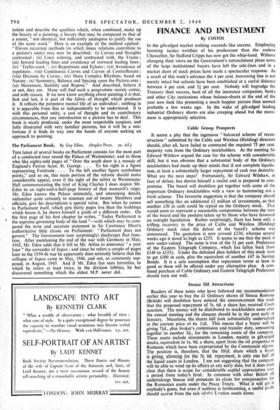FINANCE AND INVESTMENT
By CUSTOS
IN the gilt-edged market nothing succeeds like success. Employing boosting tactics worthier of his predecessor than the austere Chancellor, Sir Stafford Cripps has now got the whip-hand. Without changing their views on the Government's retrenchment plans some of the large institutional buyers have left the side-lines and in a market short of stock prices have made a spectacular response. As a result of this week's advance the 4 per cent. borrowing line is not merely intact but salients have been established at a useful distance between 4 per cent. and 34 per cent. Nobody will begrudge the Treasury their success, least of all the insurance companies, banks and other City institutions whose balance-sheets at the end of the year now look like presenting a much happier picture than seemed probable a few weeks ago. In the wake of gilt-edged leading industrial Ordinary shares are also creeping ahead but the move- ment is appropriately selective.
Cable Group Prospects
It seems a pity that the ingenious " balanced scheme of recon- struction " submitted by the Cable and Wireless (Holding) directors should, after all, have failed to command the required 75 per cent. majority vote from the Ordinary stockholders. At the meeting Sir Edward Wilshaw argued the case for the scheme with considerable skill, but it was obvious that a substantial body of the Ordinary stockholders had made up their minds that if not complete liquida- tion, at least a substantially larger repayment of cash was desirable. What are the next steps? Fortunately, Sir Edward Wilshaw, in face of defeat, has shown himself a realist and is prepared to com- promise. The board will doubtless get together with some of the important Ordinary stockholders with a view to hammering out a fresh scheme. The favourite suggestion is that the company should sell something like an additional £3 million of investments, so that another £50 in cash could be repaid on the Ordinary stock. That would seem to represent a reasonable compromise between the view of the board and the position taken up by those who have favoured an outright liquidation. Rather surprisingly, there has been only a trifling recovery in the price of Cable and Wireless (Holding) Ordinary stock since the defeat of the hoard's scheme was announced. The quotation is now around £230, whereas several weeks ago it stood as high as £255. It seems to me that the stock is now under-valued. The same is true of the 34 per cent. Preference of the Eastern Telegraph Company, which has fallen back from £140 to £1334. Under the defeated plan holders of this stock were
to get £100 in cash, plus the equivalent of another £47 in Savings Bonds. It is a safe assumption that repayment terms at least as good as these will be offered under any alternative plan. A com- bined purchase of Cable Ordinary and Eastern Telegraph Preference should turn out well.
Stcaua Oil Attractions
Readers of these notes who have followed my recommendation earlier this year to buy the £1 Ordinary shares of Steaua Romana (British) will doubtless have noticed the announcement this week that the proposed repayment of 5s. 6d. a share has received Court sanction. The money will be distributed to stockholders soon after the annual meeting and the cheques should be in the post early in January. Meantime, the shares still look substantially undervalued at the current price of 6s. 14d. This means that a buyer will be giving 74d., plus broker's commission and transfer duty, amounting together to another 3d., for the remaining assets of the company. These assets include investments in London, mainly in gilt-edged stocks, equivalent to Is. 9d. a share, apart from the oil properties in Rumania which have been expropriated by the Communist rigime. The position is, therefore, that the IOW. share which a buyer is giving, allowing for the 5s. 6d. repayment, is only one half of the liquid assets in London. I am not suggesting that the company will be able to wind up its affairs at any early date, but it does seem clear that there is scope for considerable capital appreciation over a period from today's level. In common with other British oil undertakings Steaua will prosecute its claim for compensation for the Rumanian assets under the Peace Treaty. What it will get is anybody's guess, but even if nothing is forthcoming, a useful profit should accrue from the sale of•the L,,ndon assets alone.


































 Previous page
Previous page